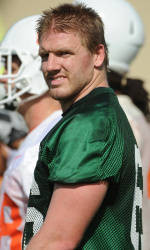
AP: After Early End To Playing Career, Ayles Eyes Coaching
Nov. 4, 2011
By TIM REYNOLDS
AP Sports Writer
CORAL GABLES, Fla. — Miami tight end Blake Ayles immediately realized what was happening. You have that many concussions, you know when you have another one. The bad headache arrived quickly after he took the bonejarring hit, followed by a sensation that his head was filling like some sort of balloon, feeling like his skull was bursting with every step.
When someone asked if he was all right, Ayles couldn’t respond.
It was early in Miami’s training camp, a steamy August day, and right then and there – unbeknownst to anyone at the time – his football career ended.
Ayles’ story end is one of many cautionary ones that is hitting football of late,in this era where head injuries and concussions are monitored more closely than ever before. Ayles will never play in a game for the Hurricanes, a retired player of sorts at the all-too-young age of 22, a transfer from Southern California who fought through injuries throughout much of his collegiate career.
This last one – concussion No. 7 since high school, at least by his count – there was no fighting.
“It’s a tough first initial hit and then it keeps getting tougher and tougher,” Ayles said in an interview with The Associated Press. “But I’m still breathing. I’m still walking around. I’m thanking God for that, but that football playing chapter in my life is closed. Time to find a new one.”
His career may have been short-lived, but it wasn’t short-changed. Ayles takes some consolation in that he was part of two of college football’s most storied programs, USC and Miami. He caught only 14 passes, but after one of them in particular, he heard the cries of 94,000 people cheering for him – his only collegiate touchdown, a 1-yard catch against Ohio State in 2008, a moment he’s never forgotten.
Someone else who remembers it?
The man who threw that pass, current New York Jets quarterback Mark Sanchez, Ayles’ teammate at USC.
“He was a heck of an athlete,” Sanchez said. “You know, he looked like one of the tight ends from New England or even a Jeremy Shockey type of player. He was real athletic, tall and had good hands – real soft hands. He could catch a ball over the middle and not even blink. He would almost kind of absorb it and use the momentum of the ball and catch it. He was a really good player.”
Sanchez knew of Ayles before the tight end ever played for USC. The word of how good this kid was spread around California starting with his days playing Pop Warner, Sanchez said.
“You hear about kids with that kind of talent,” Sanchez said.
With Ayles, the talent just wasn’t enough. His career at USC was marred by concussions, including one he acknowledged keeping hidden for several days as a freshman. That season, along with his sophomore campaign, were both cut short by knee injuries.
But at 6-foot-5, 245 pounds, with great hands and maybe even better instincts, Miami saw Ayles as a prototypical tight end. In spring ball, Ayles proved them right.
“It was tough because we brought him here to start,” Miami coach Al Golden said. “You don’t bring a fourth- or fifth-year guy here not to start.”
Ayles won the job in the spring. A week into fall camp, he was essentially off the depth chart for good. Miami touts itself as having some of the finest sports medicine specialists around, and Ayles was put through an incredibly comprehensive battery of tests over a fairly lengthy period. It took so long, in fact, that what the doctors were going to say when the process ended was really no surprise to anyone.
“Obviously, it was emotional when it finally came down,” Golden said. “At the same time, he had some time to prep for it. Then you go through the denial phase. I don’t want to sound like Kubler-Ross, butthat’s what you go through. I think he’s accepted it now and knows what he has to do.”
Ayles tried to get back on the field. Even after the August hit, he attempted to convince Golden he was fine and could return to the field right away.
“People don’t realize how much time and effort players put into it,” Ayles said. “Just for your name to be mentioned, one weekend, that’s the moment we fight for. But then it came to that point where you know you could really damage yourself, damage your future, damage your life, if you keep doing this.”
Physically, Ayles is doing fine. There are still plenty of lingering effects from this last concussion, mostly on the mental side.
When Ayles is alone with his thoughts, that’s when the pain returns.
“The main thing is just going to bed at night, that’s when I start thinking about stuff,” Ayles said. “My head just keeps running. All my thoughts just keep running. I start thinking and bringing it all up. The headaches, all that, it all just feels like a dream. But I’m feeling good, though.”
He intends to graduate from Miami, and his football career might resume in 2012 – as a coach.
Golden has already asked Ayles to be part of his staff going forward. In a span of really only a few weeks on the field together, Ayles showed Golden – a former tight end himself – all he needed to prove that he understands how to play the position at a high level.
“He has an open invitation to stay with us and start his coaching career here,” Golden said. “We loved him. He’s very bright and he has savvy, his hands, his hat placement, footwork that he can share with those guys. Just unfortunate that we never saw it come into fruition.”






